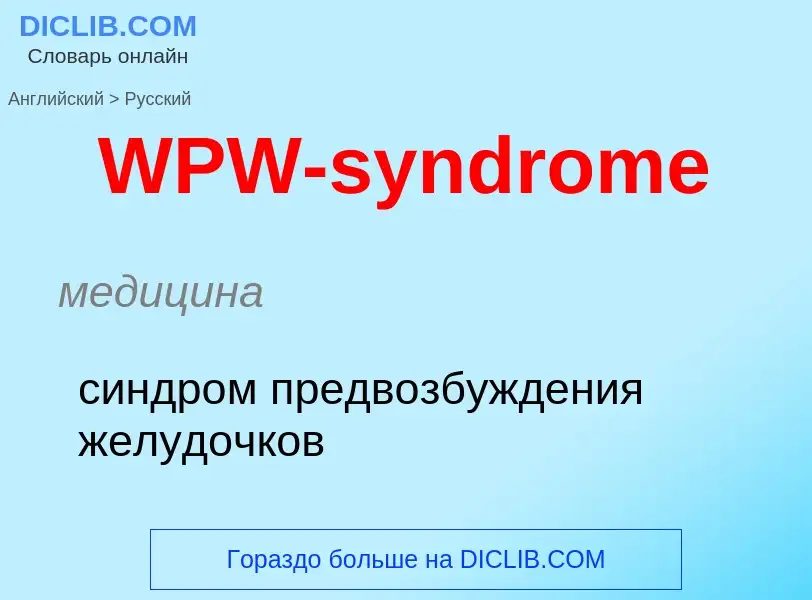Tradução e análise de palavras por inteligência artificial ChatGPT
Nesta página você pode obter uma análise detalhada de uma palavra ou frase, produzida usando a melhor tecnologia de inteligência artificial até o momento:
- como a palavra é usada
- frequência de uso
- é usado com mais frequência na fala oral ou escrita
- opções de tradução de palavras
- exemplos de uso (várias frases com tradução)
- etimologia
WPW-syndrome - tradução para russo
медицина
синдром предвозбуждения желудочков
синдром Вольффа-Паркинсона-Уайта (ВПУ)
кардиология
синдром Вольффа-Паркинсона-Уайта (ВПУ)
медицина
гипофизарный евнухоидизм
адипозогенитальная дистрофия
гипофизарное ожирение
Wikipédia
Wolff–Parkinson–White syndrome (WPWS) is a disorder due to a specific type of problem with the electrical system of the heart involving an accessory pathway able to conduct electrical current between the atria and the ventricles, thus bypassing the atrioventricular node. About 60% of people with the electrical problem developed symptoms, which may include an abnormally fast heartbeat, palpitations, shortness of breath, lightheadedness, or syncope. Rarely, cardiac arrest may occur. The most common type of irregular heartbeat that occurs is known as paroxysmal supraventricular tachycardia.
The cause of WPW is typically unknown and is likely due to a combination of chance and genetic factors. A small number of cases are due to a mutation of the PRKAG2 gene which may be inherited in an autosomal dominant fashion. The underlying mechanism involves an accessory electrical conduction pathway between the atria and the ventricles. It is associated with other conditions such as Ebstein anomaly and hypokalemic periodic paralysis. The diagnosis of WPW occurs with a combination of palpitations and when an electrocardiogram (ECG) show a short PR interval and a delta wave. It is a type of pre-excitation syndrome.
WPW syndrome may be monitored or treated with either medications or an ablation (destroying the tissues) such as with radiofrequency catheter ablation. It affects between 0.1 and 0.3% in the population. The risk of death in those without symptoms is about 0.5% per year in children and 0.1% per year in adults. In some cases, non-invasive monitoring may help to more carefully risk stratify patients into a lower risk category. In those without symptoms ongoing observation may be reasonable. In those with WPW complicated by atrial fibrillation, cardioversion or the medication procainamide may be used. The condition is named after Louis Wolff, John Parkinson, and Paul Dudley White who described the ECG findings in 1930.

![Transmission of a [[cardiac action potential]] through the conduction system of the normal human heart Transmission of a [[cardiac action potential]] through the conduction system of the normal human heart](https://commons.wikimedia.org/wiki/Special:FilePath/ECG Principle fast.gif?width=200)
![bundle of Kent]] in Wolff–Parkinson–White syndrome bundle of Kent]] in Wolff–Parkinson–White syndrome](https://commons.wikimedia.org/wiki/Special:FilePath/WPW.jpeg?width=200)

